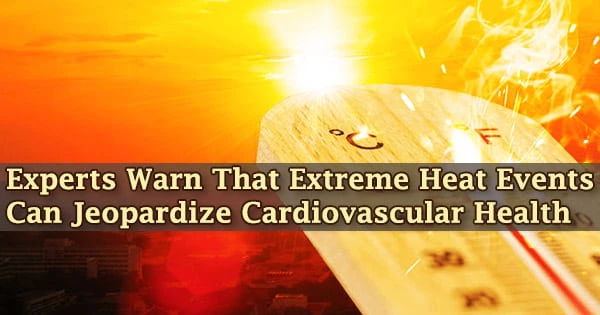A consequence of global warming is an increasing frequency and intensity of extreme heat episodes. This excessive heat is linked to a higher risk of unfavorable cardiovascular events, especially in those who already have heart disease.
Experts address how high heat impacts cardiovascular health, why health professionals should be concerned, and what recommendations they may make to reduce the repercussions in the Canadian Journal of Cardiology, published by Elsevier.
Extreme heat events, such as heatwaves, are expected to become more often, severe, and long-lasting. Extreme heat is dangerous to people’s health since it raises the risk of morbidity and mortality. 70,000 deaths were ascribed to the European heatwave of 2003, and 55,000 deaths were attributed to the Russian heatwave of 2010.
Age, chronic illnesses, social isolation, some medications, and a lack of access to air conditioning are all risk factors for heat-related hospitalization. Cardiovascular diseases are frequently identified as a risk factor for heat-related hospitalization and death among chronic illnesses.
“The Intergovernmental Panel on Climate Change (IPCC) recently reported that global temperatures are rising at a greater rate than previously projected and that the number of extreme heat days will significantly increase across most land regions,” explained senior author Daniel Gagnon, Ph.D., Montreal Heart Institute, and School of Kinesiology and Exercise Science, University of Montreal, Montreal, Canada.
The Intergovernmental Panel on Climate Change (IPCC) recently reported that global temperatures are rising at a greater rate than previously projected and that the number of extreme heat days will significantly increase across most land regions.
Daniel Gagnon
“Although we don’t yet fully understand the reasons, people with cardiovascular disease are at greater risk of hospitalizations and death during extreme heat events.”
The scientists looked at a lot of evidence-based epidemiological research and found a continuous link between excessive heat and a higher chance of bad cardiovascular outcomes.
They also looked at systematic reviews and meta-analyses that looked at the impact of severe heat on negative cardiovascular outcomes and found that heatwaves raise the risk of death from ischemic heart disease, stroke, and heart failure.
“Although the effects of extreme heat on adverse cardiovascular events have been explained in the context of heatstroke, many events occur without heatstroke, and the mechanisms of these events in the absence of heatstroke remain unclear,” observed Dr. Gagnon. “It is likely that heat exposure increases myocardial oxygen needs.”
Heat exposure may place too much strain on the heart in people with heart disease, and heat exposure may raise the chance of blood clots forming in the blood arteries that supply the heart, according to the authors.
Preventive efforts to lower cardiovascular risk during extreme heat events, according to the authors, should attempt to reduce the amount of hyperthermia and dehydration. Heat-health warning systems in Canada serve as the first line of defense, increasing awareness of impending heat events and advising methods to reduce the risk of heat-related complications.
In Ontario and Québec, for example, heat warnings are issued 18-24 hours ahead of a heat event when the ambient temperature is expected to stay above 30 degrees Celsius for at least two days.
Identifying the indicators of heat stress, ensuring people drink enough cold fluid, and seeking an air-conditioned setting are all public advice.
Recent research suggests that using an electric fan, moistening the skin, and submerging the feet in tap water as simple ways to stay cool during extreme heat events are viable alternatives to air conditioning.
“Air conditioning is the most effective strategy that can be recommended since it effectively removes the heat stimulus and minimizes the risk of adverse cardiovascular outcomes,” commented Dr. Gagnon. “However, less than one-third of global households own air conditioning.”
More research is needed, according to the authors, to better understand why extreme heat is linked to a higher risk of adverse cardiovascular outcomes; the impact of cardiovascular medication on the human body’s physiological responses during heat exposure; the best cooling strategies for people with heart disease during heat waves; and safe environmental limits for outdoor exercise in people with heart disease.
“Cardiovascular health professionals need to be aware of the negative consequences of extreme heat on cardiovascular health. A better awareness and understanding of the cardiovascular consequences of extreme heat, and of the measures to take to prevent and mitigate adverse events, will help us all assess the risk and optimize the care of patients exposed to an increasingly warm climate,” concluded Dr. Gagnon.





